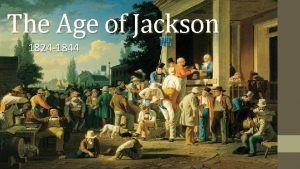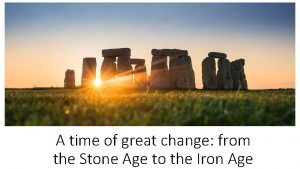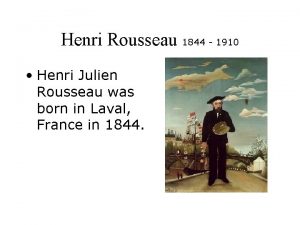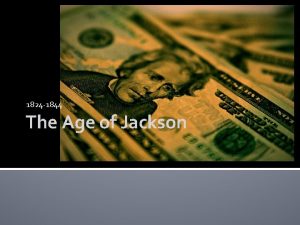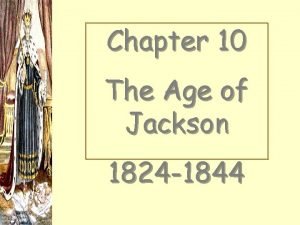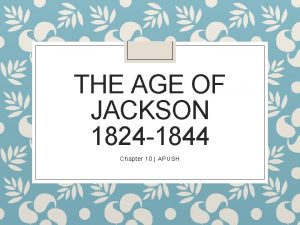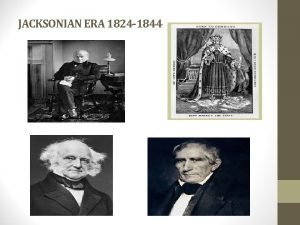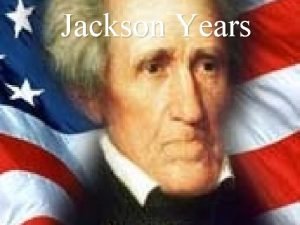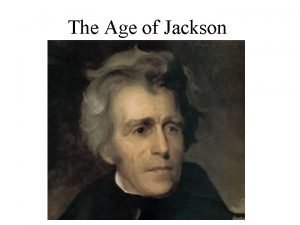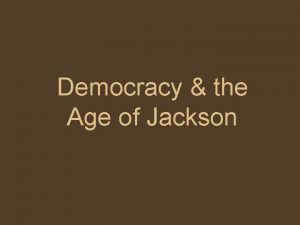The Age of Jackson 1824 1844 De Toy










- Slides: 10

The Age of Jackson 1824 -1844 De. Toy - APUSH Mr.

Jacksonian Democracy … Complex social and economic changes ➔The Rise of a Democratic Society ◆ Democratic attitudes in daily life ● social class indistinguishable by foreigners (hotels, trains, fashion, etc. ) ○ Alexis de Tocqueville, Democracy in America - French aristocrat and observer ● principle of equality in opportunity… but for WHO? ○ NO female equivalent to “self-made man”

Politics of the Common Man Politics becoming more accessible due to new suffrage laws, changes in party system, improved education and increased newspaper circulation ➔Universal male suffrage ◆ many new states allowed ALL white males to vote/hold office → many eastern states follow suit ◆ voter turnout in presidential elections 1824 -40 went up from 350, 000 to 2. 4 m ➔Party nominating conventions ◆ Rather than leaving nomination up to state legislatures or “King Caucus”, voters and politicians would convene for big discussions about potential candidates ➔Popular election of the president ◆ Popular vote, rather than state legislatures, select “electors” of electoral college

➔Rise of third parties ◆ Democrats and Whigs dominated political landscape during Jacksonian era but prompted emergence of new, more specific parties … Anti-Masons, Workingmen’s party, etc. ➔More elected offices, rather than appointments ➔Popular campaigning ◆ candidates appealed to the masses (interests/prejudices) ● resulted in ad hominem attacks and ignoring of issues while campaigning ◆ campaigns of 1830 -40 s became a sort of entertainment… parades/rallies with free food/drink ➔ Spoils system and rotation of officeholders ◆ winning office became ultimate goal of parties… not necessarily policy or reform ◆ Jackson resorted to firing all non-campaigners in previous election and appointing of supporters

Adams Jackson political change set in motion before Jackson VS (Adams was the first president to be photographed)

➔Election of 1824 ◆ Era of Good Feelings during Monroe’s presidency ended with bitter divisions in 1824 ◆ 4 candidates of Dem-Rep party campaigned: J. Q. Adams, Clay, Crawford and Jackson ◆ Jackson won popular vote (6 states still relied on legislature) by landslide but did not have majority of electoral votes… House of Representatives had to pick… Clay pulled strings and got Adams elected, who appointed Clay as Secretary of State ● Jackson and his supporters accused Republicans of striking a “corrupt bargain” ➔President John Quincy Adams ◆ alienated pro-Jackson majority of population with American System reforms/policies that Jackson viewed as unconstitutional (federal expenses) ● Internal improvements, aid to manufacturing, and “Tariff of Abominations”

Presidency of Andrew Jackson- extraordinarily ordinary man Symbol of emerging working class and middle class across the country. Living legend due to war exploits. First non-college educated president since GW. ➔Presidential power ◆ frugal Jeffersonian, protecting common man against abuse from rich/privileged… ● opposed increased federal spending and national debt ● strict constructionism = more vetoes of Congress than all preceding presidents combined ➔Indian Removal Act (1830) ◆ Jackson sympathized with land-hungry → most humane solution to compel Indians to leave homelands and resettle W of Mississippi R. ◆ Act forced resettlement of thousands → by 1835, most eastern tribes had moved

➔Nullification crisis ◆ Jackson favored states’ rights - but not disunion ● 1828: South Carolina declared Tariff of Abominations to be unconstitutional ○ affirmed Calhoun’s (Jackson’s 1 st VP) nullification theory ◆ each state has right to decide whether or not to obey a federal law ● 1832: South Carolina hold nullification convention regarding new and old tariffs ○ passed resolution forbidding collections of tariffs w/in the state ○ Jackson responded with preparations for military action but diffused situation through pressure on Congress to compromise on tariffs for southern states ➔Bank veto ◆ Bank of the US, though privately owned, received federal deposits and cushioned ups and downs of

The Two-Party System One-party system of Monroe’s time gave way to two-party system under Jackson. Both parties responding to new issues related to westward expansion and emerging industrial economy. Jackson = Democrats: Jeffersonian republicans Henry Clay = Whigs: Hamiltonian federalists ➔Jackson’s “Bank War”: reelected in 1832 and intent on destroying 2 nd Bank of the US ◆ Pet banks ● Jackson withdrew all federal funds from bank and transferred to various state banks ◆ Specie Circular ● prices for western land inflated due to speculation ○ Jackson issued executive order requiring all future purchases of federal lands be made in specie (gold and silver) rather than banknotes ◆ banknotes lost value and land sales plummeted, causing Panic of 1837 after his

End of the Jacksonian Era In 1836, Jackson persuaded Democratic Party to nominate his VP, Van Buren, in order to maintain his policies. Whigs, fearing defeat, nominated 3 candidates from different regions, hoping to force election into Ho. R. Van Buren still won with 58%. ➔President Van Buren and the Panic of 1837 ◆ Whigs blamed Democrats for laissez-faire (“let it be”) economic policies, which advocated for little federal involvement… ➔The “Log Cabin and Hard Cider” Campaign of 1840 ◆ 1840: Whigs in position to defeat Van Buren and Jacksonian Democrats due to economic woes ● leading candidate = William Henry “Tippecanoe” Harrison ● crazy mudslinging and extravagant campaign… “Martin Van Ruin” ● 78% voter turnout elected “Tippecanoe and Tyler, too”
 Guided reading & analysis: the age of jackson, 1824-1844
Guided reading & analysis: the age of jackson, 1824-1844 The age of jackson 1824-1844
The age of jackson 1824-1844 Aetoys
Aetoys God of secrets name
God of secrets name Romantic period 1798 to 1832
Romantic period 1798 to 1832 The romantic age (1798 to 1824)
The romantic age (1798 to 1824) Iron age bronze age stone age timeline
Iron age bronze age stone age timeline Iron age bronze age stone age timeline
Iron age bronze age stone age timeline Prantsuse poeet 1844-1896
Prantsuse poeet 1844-1896 Jointstock
Jointstock Henri julien rousseau
Henri julien rousseau
